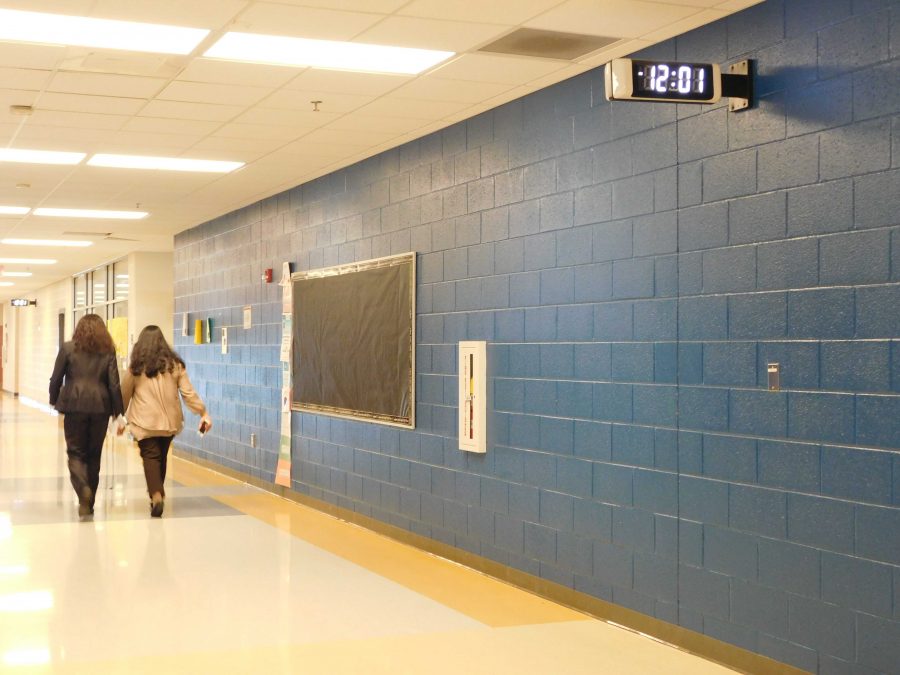Chamblee faculty members have been formally discussing potential new schedule structures for the 2017-2018 school year since January of 2017. Proposed schedules include variations of a block schedule or a modified seven period schedule with time for enrichment and remediation.
“The idea is that we are exploring alternative methods of scheduling the day to support all students,” said science teacher DeAnn Peterson. “And so there are lots of other ways that other schools do their day. So we’re exploring all kinds of different options.”
Although the talks began in the idea that a new schedule could possibly aid failing students, part of the discussion is whether a new schedule is needed at all.
“The problem is just that we’re facing enormous challenges with the classes we teach,” said math teacher Dr. Andrew Milne. “And some of this isn’t new. But it’s just a matter of we know that we have many students who are struggling and who are not being served well by the way we’re doing things, and the question is, is the schedule a way of fixing it?”
Chamblee faculty members have visited both Tucker and Walton High Schools in order to examine their schedules. Tucker High School has a hybrid block schedule that alternates between seven period days and block days, and Walton High School has a modified seventh period schedule with a zero period and an advisement period.
“But we want something that fits everybody, from English language learners to AP students,” said Peterson. “So what does that look like? Can we do that? Can we find some kind of schedule that fits everybody?”
Several different scheduling models have been proposed.
“One that’s been proposed is keeping our seven period day intact, but carving a out a little bit more time during the day by having a little bit less time during given periods,” said Chamblee Principal Dr. Norman C. Sauce III. “So that there can be some enrichment or remediation or intervention for kids that are either doing really really well or kids that are really really really struggling during the school day, without changing the schedule that we have right now very much.”
Variants of a block schedule, where classes would meet less frequently and for longer periods of time, were among several of the other options.
“Other options to review have been four by four blocks, which are in use in a lot of DeKalb schools,” said Sauce. “So people have proposed some sort of hybrid between a normal seven period day and block days, where some days, like two days a week they’ll have blocks, and three days a week they’ll have seven periods. And everything in between. Some people have suggested that we look at just a pure block, where you do have seven periods for the entire school year, but you’ll have like three or four periods on Monday and three or four periods on Tuesday, and it’s rotation throughout the year.”
Some classes may work better with a block schedule than others.
“I, as a science teachers, I love block schedule,” said Peterson. “I can fit a lab in without yelling at my kids, ‘hurry up hurry up hurry up!’, and so science easily lends itself to the block schedule. Other subjects, not so much, and certainly the styles of other teachers, they wouldn’t necessarily want to be for a block type of schedule.”
Chamblee students have exhibited varying levels of acceptance of a block schedule.
“I particularly like the block schedule,” says freshman Grace Brown. “You get two days to do your homework, you get a break from each class like every other day, and we could either have a study hall, or we could have an additional class.”
However, Brown acknowledges the disadvantages.
“If you don’t like a teacher, then you’re stuck with them for like an hour and a half,” she said. “So I guess that’s a downside.”
Freshman Jediah Agbossoumonde had a block schedule in elementary school.
“I think now, that we’re in high school we have seven classes, we should have a study period as well,” said Agbossoumonde. “Then people can get their homework done faster or they can go to tutorial, or they can study or get help for things if they can’t come after school.”
Agbossoumonde had another idea for a block schedule’s extra period.
“Maybe we can have club meetings, because some people can’t come early in the morning and some people can’t come after school,” she said. “So if they’re going to do anything to the schedule that probably should be the only thing.”
Still, Agbossoumonde thinks that block periods may be too long.
“I just feel like some classes that don’t need as much time would be given too much time,” she said. “And you wouldn’t be learning anything, it would be unproductive.”
Senior Emily Wynne attended Tucker High School for her freshman and sophomore years.
“It was two full days a week we would do class periods that were about 90 minutes a piece if not longer,” said Wynne. “It was helpful in some ways because if you did go to that class you would get a lot done. But then it wasn’t very helpful when you needed to get things done and you only had a fifty minute period.”
Wynne’s likes and dislikes of the block schedule were not the same as many students anticipate.
“I liked that if we didn’t have a teacher there, we didn’t do anything for two hours,” she said. “But things that I didn’t like, probably having to take tests and quizzes in that block period. Because after we would finish with the tests and quizzes, the teachers would give us new assignments and start working on different things.”
Wynne had a suggestion for any possible future block at Chamblee.
“On Wednesdays when we would go to an eighth period, and they only have seven periods, that we don’t go to our homeroom,” she said. “Because so many kids would skip and a lot of problems would happen that day of the week.”
So far the process has been conducted through several faculty-led discussions and feedback sessions, to be concluded by the end of February.
“Our goal is to have a recommendation for any changes or modifications that we might make, or maybe not make, that option’s on the table too,” said Sauce. “In early March though, we can share with the broader community to get a little bit more feedback and then eventually our governing board will have to vote on and make a final decision on what we do with the schedule.”
The tight pace is necessary, says Sauce.
“We can’t drag this out into the summer or whatever,” said Sauce. “If we’re going to make any changes, which we may or may not, we have to make a decision this spring, so that we can be ready to start instructing on day one of next school year.”
Categories:
Can a New Schedule Structure Meet Chamblee’s Needs?
Christina Jordan, Author
March 3, 2017
Story continues below advertisement
0
Tags:
Donate to The Blue & Gold
$0
$250
Contributed
Our Goal
Your donation will support the student journalists of Chamblee High School Blue & Gold. Your contribution will allow us to print editions of our work and cover our annual website hosting costs. Currently, we are working to fund a Halloween satire edition.
More to Discover
About the Contributor
Christina Jordan, Author



